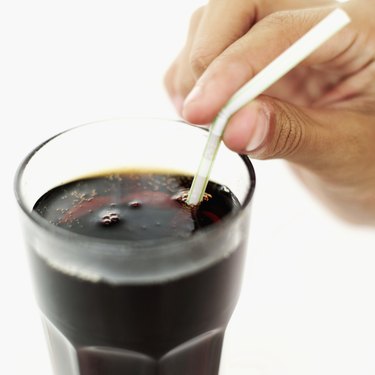Do Diet Sodas Contain Preservatives

Most soft drinks contain various amounts of sodium benzoate used as a preservative.
Image Credit: Stockbyte/Stockbyte/Getty Images
Sodium benzoate is added to soft drinks as a preservative and a bacteria-destroying agent. The Asthma and Allergy Foundation of America states that significant numbers of people report allergic reactions to the compound. The American Beverage Association reports another significant problem with the preservative in drinks: Soft drinks using ascorbic acid along with sodium benzoate, when slightly heated, carry the additional risk of the two ingredients combining to form a known cancer-causing compound called benzene.
Diet Soft Drinks
Sodium benzoate, also known as E211, is a major ingredient in diet soft drinks. The Center for Science in the Public Interest reports that benzoic acid has properties similar to E211 and also creates allergy problems, hives and aggravation of asthma conditions.
Diet Coke made by Coca-Cola does not contain sodium benzoate, a change that was made voluntarily by the company in 2008. Coca-Cola's other drinks, including Fanta and Sprite, continue to use E211 in production. The company states that alternatives to E211 impact preservation and change the taste of the product. Pepsi Max, as well as the diet versions of Mountain Dew, Sunkist Orange, Nestea and Nordic Mist, also continue to use the preservative throughout the world.
Diet Coke, Diet Pepsi and Lipton Diet Iced Tea have shifted to potassium benzoate and citric acid to act as preservatives in both canned and plastic-bottled soft drinks.
Regular Soft Drinks
Some, but not all, commercial soft drink companies use sodium benzoate as a preservative. Pepsi does not have the ingredient, while Dr. Pepper uses E211 for soft drinks bottled in plastic containers but not in aluminum cans. Mountain Dew in all forms of packaging uses E211 in addition to other preservatives including erythorbic acid and calcium disodium EDTA. Dr. Pepper speciality drinks, including cherry vanilla soda, berries and cream, and cherry soda, all contain sodium benzoate. 7 UP products shifted from sodium benzoate to use potassium benzoate and vitamin E acetate as preservatives.
Carbonated soda water and tonic water drinks, including drinks produced under the Schweppes brand, also use sodium benzoate as a preservative. Sugar- and fruit-flavored waters such as Nestle's fruit and water drinks and Saratoga brand Ripple Water drinks also include E211 as an ingredients.
Juice-Based Soft Drinks
Hsien-Hsien Lei, a biotech and epidemiological consultant, reported in 2007 in "DNA and Disease" that a combination of sodium benzoate and vitamin C damages the mitochondrial DNA in the body. The research originally done by Peter Piper, a researcher on aging and a professor of biotechnology and molecular biology at Sheffield University in the United Kingdom, isolated the damage of E211 to the cell DNA.
The mixture of ascorbic acid, commonly known as vitamin C, and E211 or sodium benzoate, combines to form benzene. Numerous products, including Fanta Pineapple and Vault Zero, included the two ingredients before the products were removed from the shelves in 2006 in the wake of a lawsuit that required Coca-Cola to halt sales. PepsiCo also removed E211 from many drinks to prevent lawsuits.
Do Diet Sodas Contain Preservatives
Source: https://www.livestrong.com/article/256440-what-soft-drinks-have-sodium-benzoate-e211-in-them/
0 Response to "Do Diet Sodas Contain Preservatives"
Post a Comment